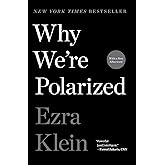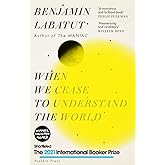
Buy new:
$29.99$29.99
Ships from: Amazon.com Sold by: Amazon.com
Save with Used - Acceptable
$10.44$10.44
$3.99 delivery June 18 - 25
Ships from: Goodwill Minnesota Sold by: Goodwill Minnesota

Download the free Kindle app and start reading Kindle books instantly on your smartphone, tablet, or computer - no Kindle device required.
Read instantly on your browser with Kindle for Web.
Using your mobile phone camera - scan the code below and download the Kindle app.



 Audible sample
Audible sample Why We're Polarized Audio CD – Unabridged, January 28, 2020
Purchase options and add-ons
One of Bill Gates’s “5 books to read this summer,” this New York Times and Wall Street Journal bestseller shows us that America’s political system isn’t broken. The truth is scarier: it’s working exactly as designed. In this “superbly researched” (The Washington Post) and timely book, journalist Ezra Klein reveals how that system is polarizing us—and how we are polarizing it—with disastrous results.
“The American political system—which includes everyone from voters to journalists to the president—is full of rational actors making rational decisions given the incentives they face,” writes political analyst Ezra Klein. “We are a collection of functional parts whose efforts combine into a dysfunctional whole.”
“A thoughtful, clear and persuasive analysis” (The New York Times Book Review), Why We’re Polarized reveals the structural and psychological forces behind America’s descent into division and dysfunction. Neither a polemic nor a lament, this book offers a clear framework for understanding everything from Trump’s rise to the Democratic Party’s leftward shift to the politicization of everyday culture.
America is polarized, first and foremost, by identity. Everyone engaged in American politics is engaged, at some level, in identity politics. Over the past fifty years in America, our partisan identities have merged with our racial, religious, geographic, ideological, and cultural identities. These merged identities have attained a weight that is breaking much in our politics and tearing at the bonds that hold this country together.
Klein shows how and why American politics polarized around identity in the 20th century, and what that polarization did to the way we see the world and one another. And he traces the feedback loops between polarized political identities and polarized political institutions that are driving our system toward crisis.
“Well worth reading” (New York magazine), this is an “eye-opening” (O, The Oprah Magazine) book that will change how you look at politics—and perhaps at yourself.
- LanguageEnglish
- PublisherSimon & Schuster Audio
- Publication dateJanuary 28, 2020
- Dimensions5 x 1 x 5.88 inches
- ISBN-101797107658
- ISBN-13978-1797107653
Book recommendations, author interviews, editors' picks, and more. Read it now.
Frequently purchased items with fast delivery
Editorial Reviews
Review
About the Author
Product details
- Publisher : Simon & Schuster Audio
- Publication date : January 28, 2020
- Edition : Unabridged
- Language : English
- ISBN-10 : 1797107658
- ISBN-13 : 978-1797107653
- Dimensions : 5 x 1 x 5.88 inches
- Best Sellers Rank: #3,541,627 in Books (See Top 100 in Books)
- #6 in United States National Government
- #12 in Political Conservatism & Liberalism
- #1,189 in United States History (Books)
- Customer Reviews:
About the author

Ezra Klein is the editor-at-large and cofounder of Vox, the award-winning explanatory news organization. Launched in 2014, Vox reaches over 50 million people across its platforms each month. Klein is also the host of the podcast The Ezra Klein Show, cohost of the Weeds podcast, and an executive producer on Vox’s Netflix show, Explained. Previously, Klein was a columnist and editor at The Washington Post, a policy analyst at MSNBC, and a contributor to Bloomberg. He’s written for The New Yorker and The New York Review of Books, and appeared on Face the Nation, The Daily Show, PBS NewsHour, and many more.
Customer reviews
Customer Reviews, including Product Star Ratings help customers to learn more about the product and decide whether it is the right product for them.
To calculate the overall star rating and percentage breakdown by star, we don’t use a simple average. Instead, our system considers things like how recent a review is and if the reviewer bought the item on Amazon. It also analyzed reviews to verify trustworthiness.
Learn more how customers reviews work on AmazonCustomers say
Customers find the book insightful and well-researched, providing a good dive into political science. Moreover, the writing style is clear and objective, making it a fascinating read. Additionally, they appreciate its thought-provoking content and identity politics analysis, with one customer highlighting its detailed exploration of white political identity.
AI Generated from the text of customer reviews
Select to learn more
Customers find the book insightful and well-researched, providing a good dive into political science.
"Ezra Klein’s Why We’re Polarized is an enlightening, smart and thought provoking look at how America, and its 2 main political parties, got so..." Read more
"...It implicates capitalism and geography, politicians and political institutions, human psychology and America’s changing demography.”" Read more
"...It examines studies that had surprising results. It’s not necessarily intelligence or lack of it that motivates polarization...." Read more
"...Political parties and partisanship are GOOD and NECESSARY because organizing into a party is how that bloc of 17% of voters gets those 17% of seats..." Read more
Customers find the book fascinating and easy to read, with one customer noting it reads like a textbook.
"...It puts things in perspective. I like the book. It tackles an interesting subject while making it understandable." Read more
"...I thoroughly enjoy his podcast, even when I disagree with something in the conversation...." Read more
"...Overall, it's okay, if you're moderately interested in politics it might get your feet wet...." Read more
"...Maybe Klein doesn’t particularly think that’s possible. Who knows. Decent read." Read more
Customers find the book easy to read, with clear writing that presents an objective view, and one customer notes how it makes complex topics digestible.
"...Overall I found the book well written, eye opening and engaging...." Read more
"...I think he goes a long way in describing the polarization in American politics. A lot of it is identity politics. Group think...." Read more
"In this Review: The key finding. Why 5 stars? Brief synopsis by chapter. What’s missing? And where to find it...." Read more
"...the book was thought provoking, knowledge expanding, and written in good faith...." Read more
Customers find the book thought-provoking, with one customer noting the well-designed experiments and another appreciating the flowing prose.
"Ezra Klein’s Why We’re Polarized is an enlightening, smart and thought provoking look at how America, and its 2 main political parties, got so..." Read more
"...out the scientific evidence so clearly, and the experiments he draws on are so well-designed, that there’s no room for doubt...." Read more
"...With that aside though, the actual substance of the book is rather... lacking...." Read more
"...Ezra Klein's book was all of those things, as well as a useful look at his model of our current political polarization and the research he did to..." Read more
Customers appreciate the book's exploration of identity politics, with one customer highlighting its reliance on political psychology and sociology, while another notes how well it explains cultural dynamics.
"...There is an interesting discussion on white political identity, which emerges in periods of threat and challenges, and how racial resentment fuels..." Read more
"This book is about tribalism and the conquest of party identity over any other identity...." Read more
"Stitching together social sciences and group psychology studies with an astute reading of political events, Klein composes a clear picture of how..." Read more
"...I really appreciated his take on “mega-identities” and how those are triggered now in a multitude of ways, as well as his identification of the..." Read more
Reviews with images
Top reviews from the United States
There was a problem filtering reviews. Please reload the page.
- Reviewed in the United States on March 25, 2020Format: KindleVerified PurchaseEzra Klein’s Why We’re Polarized is an enlightening, smart and thought provoking look at how America, and its 2 main political parties, got so polarized.
Klein explores several key narratives including the psychology of group think and identity; a nation that has increasingly sorted itself geographically and ideologically; the nationalization of news and politics; the decline of local and regional news; a declining and enraged power elite of white, aging, Christians; a 50 year campaign by reactionaries to create a culture war based on grievances and abstractions, and a 24/7 cable news and talk radio cycle that exists to stoke division and get attention for itself.
The book begins with the story about a group of political scientists in the late 1950s who proposed that the two parties, Democrats and Republicans, were too similar and that the public is better served with a less homogenous and more polarized party system.
Klein then delves into some studies around evolutionary psychology, social science, group allegiance and self identity. He presents several example studies of how easily humans sort into us vs them group loyalty and how group identity is stronger than ideology or reason. He cites several studies that prove that fear and hate of out-groups is more powerful than loyalty to your in-group.
He then argues that Trump is not an anomaly but rather a natural outgrowth of the Republican movement of the past 40 years. A party whose power is increasingly reliant on a declining white, aging, conservative, Christian demographic which is terrified of losing power and privilege. “When you're accustomed to privilege, equality feels like oppression”.
Trump’s latching onto grievances of race and political correctness fulfill a fearful minority’s fantasies of restoration and renewal.
Klein explores how the electorate was more ideologically similar across parties 50 years ago when ticket splitting was more common and compromises easier to forge. There were also more diverse cross sections of cultural difference within each party. That changed with the civil rights act of 1964 when the southern Democrat “Dixiecrats” moved to the Republican party under the nomination of Barry Goldwater who was opposed to the act. Yes, polarization has a lot to do with racism.
The geographic sorting of the nation which began in the 1960s and accelerated in the 1990s concentrated older, white Americans into the exurbs and the younger, better educated, more diverse Americans into the suburbs and cities. This phenomenon gave the Republicans an opportunity to better target their constituents and create identity narratives that weren’t about compromise and cooperation, but rather grievance and fear of the other side.
Democrats grew their portion of the electorate by maintaining a strong sense of diversity and compromise but were disadvantaged because of disproportionate Senate representation in rural states. So as younger Americans began concentrating in cities, their political power weakened as a result of Senate rules, gerrymandering and the electoral college.
Over the past 20 years, political campaign demographers began re-defining the dividing line between Republican vs Democrat - those living in areas with less than 900 people per square mile leaned Republican, and areas with more than 900 people per square mile leaned Democrat. In Jonathan's Haidt's book The Righteous Mind - he called it the Whole Foods vs Cracker Barrel divide. Where you ate or shopped for groceries became a bigger indicator of your political party than income, education or many other traditional metrics.
Klein then discusses the explosion of cable news and the decline of local reporting. This elevated national politics and politicians which made obsolete the old adage - all politics is local. This also forced politicians to devalue compromise and promote winner-take-all mindsets. This had a greater effect on the Republican party being their constituents were a declining electorate.
Dems also rely on a much broader set of news sources, not one source exceeding 15% of their total news consumption, whereas Repubs rely almost exclusively on Fox News and a few similar reinforcers in talk radio. This leads to a Republican party with a more narrow and homogenous view of the world and reinforces the concept of group identity and grievance.
Klein argues that the Republican party is well aware of its demographic challenges - the average white American is 58 years old, the average black American 27, the average Asian American - 29, the average Hispanic American - 11! This reality forced the Republican party to re-evaulate their strategies during GW Bush’s first term with compassionate conservatism, outreach to black and latino voters, immigration reform and other shifts. But with Obama’s election, the extreme wing of the right pursued more aggressive and desperate measures to slow the tide (Tea Party). Then along came Trump, who saw an opportunity to exploit that fear and be the fighter that they needed all along. Even evangelical Christians rationalized their support of a clearly immoral nominee by believing that in these desperate times they needed a street fighter to bring the America they grew up in back. Make America Great - Again.
Klein also proposes that the gradual weakening of parties and the growth of partisanship is another reason for our current polarization. Back in the day, prior to the caucus and primary process, party officials had more influence in selecting their candidates (smoke filled back rooms) - Klein believes that a candidate like Trump would have never gotten near the Republican nomination. We’ve flipped from a system that selected candidates who were broadly appealing to party officials to a system that selects candidates who are adored by base voters (primary voters).
Klein also defends PAC money which he says promotes moderates, while individual donations promote polarization and extremists. Individual donors want to fall in love or express their hate. Institutional donors are more pragmatic - they want moderates who can get things done.
Klein proposes a set of possible solutions to our current polarization including:
Eliminate the filibuster - which allows the minority to hamstring the majority
Get rid of the Electoral College
Control gerrymandering - promote proportional representation
Consider Ranked Choice voting
Have electoral zones represented by multiple members of congress
Make 3rd parties viable
Give Wash DC and Puerto Rico congressional representation / statehood
Make voting easier, not harder
Klein believes that with these changes the Republican party will be forced to adapt, modernize, be more competitive and less reliant on outrage, culture wars and electorate map manipulations.
Overall I found the book well written, eye opening and engaging. It follows other books I’ve read in this genre including Bill Bishop’s The Big Sort, Jon Meacham’s The Soul of America and Jonathan Judis’s The Populist Explosion. I felt the book lost its way a bit towards the end when the author was struggling to figure out how to wrap up his thesis and propose solutions. But in the end, Klein did tie up his loose ends and finished with a sensible set of policy proposals.
Highly recommended!
- Reviewed in the United States on May 22, 2020Format: KindleVerified PurchaseWhen you look at who voted for Republican candidates for president among previous elections, you find that the figures for men, women, white voters, Hispanic voters, born-again Christians, and self-identified Republicans is not much different from one election to another including the 2016 election. The author finds that voters treated Trump just as if he were another Republican, and this speaks to the enormous weight party polarization now exerts on politics today. In this book we learn how American politics became a toxic system and what it means for our future. To be clear the author states that this is a book about systems not people.
In the first part of the book we are told the story about how and why American politics polarized around identity. The Democratic and Republican Parties have changed. We are seeing something genuinely new. We see something called “negative partisanship,” where partisan behavior is driven not by positive feelings for one’s own party, but by negative feelings toward the opposing party.
Looking back through history, we learn of the power of the southern Democrats and their effect on the Democratic Party and why the Republicans didn’t become the party of civil rights. There is a distinction made between sorting verses polarization, and how polarization begets polarization, yet it doesn’t beget extremism as a study of extremism in American politics of the past demonstrates. As polarization increases through time, we see rural areas and counties going Republican and the urban areas going Democratic. An interesting point is made about how human beings have evolved to exist in groups. We clearly see this in how people take sides in sports teams – “they harness primal instincts that pulse through our psyche.” Today, how we feel matters more than what we think, and in elections, it is our feelings about the other side that holds sway – negative partisanship rears its head. Politicians know that you just don’t need support, you need anger.
The author goes on to discuss the psychology behind how people think politically. We are introduced to things such as “science comprehension thesis,” “identity-protective cognition,” and “motivated reasoning.” There is an interesting discussion on white political identity, which emerges in periods of threat and challenges, and how racial resentment fuels economic anxiety. So in the first half of the book, the author tried to “build a model of what’s driven American politics into its current place of bitter polarization.” The second half is “about the relationship between a more polarized public and more polarized political institutions.”
An interesting point made is that the more interested people were in politics, the more political media they consumed, the more mistaken they were about the other party. We see how an audience-driven media is actually an identitarian media. We end up with this echo chamber theory of polarization. We allow ourselves to hear only what information informs us of how right we are, and this makes us more extreme. We see the news media becoming the most powerful actor in politics today. The media is biased not so much toward left or right ideology, but toward the loud, outrageous, colorful, inspirational, and confrontational. It is biased toward the political stories that activate our identities.
Concerning presidential campaign strategies, we see a shift toward a stronger emphasis on base mobilization instead of trying to persuade undecided voters. How did a candidate such as our current president get elected – weak parties and strong partisanship. Such a win would have been impossible in the strong party system of fifty years ago. We can see this weakness in the parties in the 2016 primaries, where only 30 percent of eligible voters voted. All of this makes for a political system vulnerable to demagogues. Not only that, but if a political party decides to take a path to governing that involves retaking the majority and not working with the existing majority, the incentives transform. “Instead of cultivating a good relationship with your colleagues across the aisle, you need to destroy them, because you need to convince the voters to destroy them, too.” The author also offers come insights into the difference between Democrats and Republicans, the former offering a more transactionalist approach (needing to appeal to whites, nonwhites, liberals, moderates, fixed, fluid), the latter being more ideological and homogenous (more akin to a group identity actually). We also see differences in the media institutions each side uses as an information source. Democrats rely on a diversity of information sources while the Republicans rely on a narrower set of media institutions, which propel their polarization. One salient point that stuck with me was the thought that America is not really a democracy. We have a political system “built around geographic units, all of which privilege sparse, rural areas over dense, urban ones.”
The author has shown us clearly here in this book that “the polarization we see around us is the logical outcome of a complex system of incentives, technologies, identities, and political institutions. It implicates capitalism and geography, politicians and political institutions, human psychology and America’s changing demography.”
- Reviewed in the United States on December 7, 2024Format: KindleVerified PurchaseThe title of this review is part of what Ezra Klein explains in this book.
I think he goes a long way in describing the polarization in American politics.
A lot of it is identity politics. Group think.
One of my favorite sections was “ How politics makes smart people stupid”. It examines studies that had surprising results. It’s not necessarily intelligence or lack of it that motivates polarization.
He addresses the media and its effects on tribalism.
One of the strongest parts of “ Why Were Polarized” is found in the last pages where the author contrasts recent political history with the past. It puts things in perspective.
I like the book. It tackles an interesting subject while making it understandable.
Top reviews from other countries
-
 JosephReviewed in Japan on November 30, 2020
JosephReviewed in Japan on November 30, 20204.0 out of 5 stars 興味深いけど、解決策が…?
Format: HardcoverVerified Purchase「なぜ、アメリカ政治は2分化しているのか?」という問いに上手く答えられていたと思います。
2分化を進んで受け入れようとした民主党と共和党の意図から始まり、経済格差や人種割合の複雑化、2大政党制や小選挙区制、「中立」とは言えないマスコミや研究者からの主張などがアメリカ政治の2分化・分断を進めていると改めて思いました。
しかし、解決策として「比例代表制を導入すべき」という主張には納得しがたいでした。たしかに、各選挙区で様々な利益を代弁する者を当選すれば、妥協が生まれる可能性はあるでしょう。(アメリカ建国の父の一人マディソンは同じ理由で間接民主制受け入れを主張した)。しかし、様々な利益を代弁するもの同士の対立も現れるのではないでしょうか?「2分化」に代わり、「分断」が新たな問題になるでしょう。また、比例代表制では政権樹立が遅れると言うリスクもあります。
とはいえ、「アメリカ政治の2分化の原因を知りたい」という方は全編英語であれ読む価値はあるでしょう
-
 José MacayaReviewed in Spain on May 8, 2025
José MacayaReviewed in Spain on May 8, 20255.0 out of 5 stars Quién piense que EEUU es un modelo sobre cómo gobernar un país, debe leer este libro.
El libro es muy bueno. Los primeros 3 capítulos están ok; pero desde el 4 es buenísimo, lleno de información impactante. Fantástica evidencia de la falta de racionalidad del ser humano inteligente, a la hora de emitir opiniones políticas. Muy bien explicado. No es cuestión de educar más. Explica la historia de la información política y por qué hemos llegado a la polarización actual. Explica la evolución previsible hacia adelante, que no es tranquilizadora. Quién siga pensando que EEUU es un modelo sobre cómo gobernar un país, debe leer este libro.
 KBReviewed in Canada on August 15, 2020
KBReviewed in Canada on August 15, 20205.0 out of 5 stars Literally the Best Book I’ve Read on the Causes of the Current U.S. Political Environment
Format: HardcoverVerified PurchaseOver the last four years, I’ve read more than twenty books trying to obtain an understanding of the causes of today’s political environment in the U.S. Ezra Klein’s book is by far the best. The author has done considerable research and has written a comprehensive analysis on how we got to where we are in the era of Trump. He has a very entertaining and relaxed style of writing that makes the book an easy read despite the disturbing topic.
 AbhishekReviewed in India on January 30, 2025
AbhishekReviewed in India on January 30, 20255.0 out of 5 stars Fantastic for a non-american who's into American politics
The details of the events talked about in the book really help the overall experience.
 NatashaReviewed in Brazil on October 3, 2024
NatashaReviewed in Brazil on October 3, 20245.0 out of 5 stars Very clear, thanks a lot
Format: KindleVerified PurchaseAs a Brazilian living in US, this book worked as a manual for me to understand what is going on in the country and what is behind people’s thoughts, feelings and reactions. Very in depth analysis into human behavior and also American political structure. I strongly recommend.













